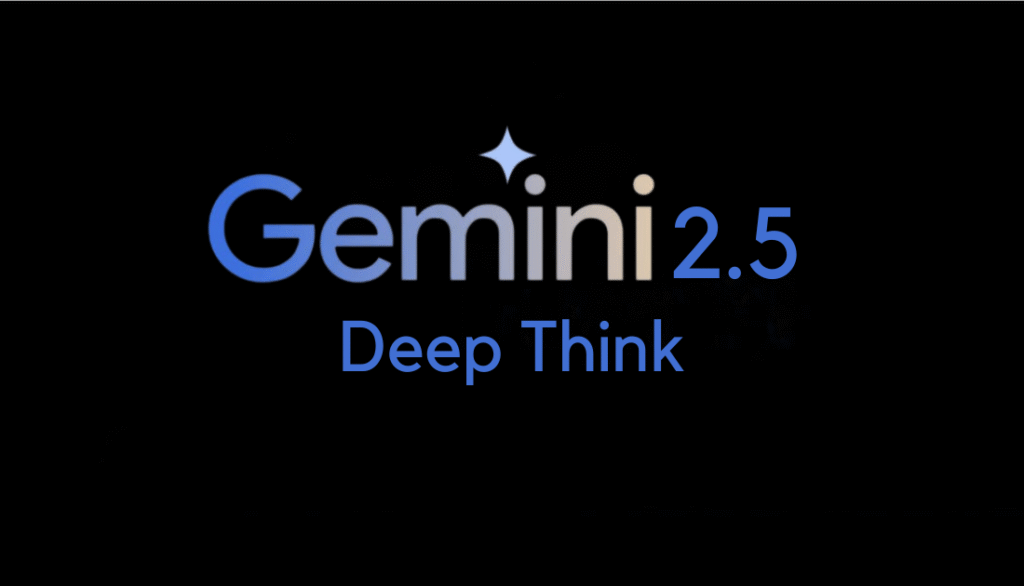Google DeepMind has officially introduced Gemini 2.5 Deep Think, a next-generation AI model designed to tackle complex problems using parallel reasoning.
Highlights
- New Era of Parallel Reasoning: Gemini 2.5 Deep Think uses multiple internal agents to analyze problems simultaneously, offering a leap over traditional single-agent models.
- High-Stakes Validation: The model earned a gold medal at the 2025 International Math Olympiad, solving five of six problems with expert-level proofs.
- Advanced Benchmarks: Outperformed Grok 4 and OpenAI’s o3 on HLE (34.8%) and LiveCodeBench6 (87.6%), showcasing superior performance in reasoning and coding tasks.
- Powered by Reinforcement Learning: Gemini fine-tunes its internal logic using feedback loops to produce more accurate and thoughtful responses.
- Creative and Academic Strength: Particularly strong in tasks requiring creativity, logic, and long-term planning.
- Deep Research Integration: Capable of scanning hundreds of sources, synthesizing complex data, and generating multi-page summaries within minutes.
- Tool Integration: Works seamlessly with code environments, Google Search, and supports structured outputs for dev and design workflows.
- Exclusive Access Model: Available only to Ultra-tier Gemini app users ($250/month), with broader rollout expected soon via APIs.
Marketed as the company’s most advanced reasoning system to date, this AI operates by evaluating multiple ideas simultaneously—an upgrade from traditional single-agent models that reason sequentially.
Starting this Friday, early access to Gemini 2.5 Deep Think will be available through the Gemini app for subscribers to Google’s $250/month Ultra plan.
Parallel Agents, Smarter Thinking
Launched earlier at Google I/O 2025, Gemini 2.5 Deep Think marks Google’s first publicly available multi-agent AI system. These systems work by spawning several internal agents that analyze different approaches to a problem in parallel.
While this method is computationally intensive, it allows the model to explore various reasoning paths before selecting the most effective answer—similar to how a panel of experts collaborates on a challenging problem.
To enhance the quality of reasoning, Google has applied new reinforcement learning techniques. This allows the model to evaluate and refine its internal reasoning steps, leading to more deliberate and accurate responses.
The model is particularly strong in tasks requiring creativity, long-term planning, and logical precision.
Real-World Application: International Math Olympiad
Gemini 2.5 Deep Think has already been validated in a high-stakes academic setting. A specialized version of the model contributed to Google’s success at the 2025 International Math Olympiad (IMO), where it solved five out of six problems—earning a gold medal with a score of 35/42.
Educators involved with the IMO noted the model’s clear and rigorous mathematical proofs, calling it a rare achievement for an AI system.
Google is currently sharing this research-grade IMO variant with a select group of academics and mathematicians.
This version is notably slower, often taking hours to complete a reasoning task, as opposed to the seconds or minutes required by standard models. The aim is to assess its performance in serious academic and scientific domains.
Where Deep Think Excels
Performance data suggests that Gemini 2.5 Deep Think isn’t just a theoretical improvement.
On Humanity’s Last Exam (HLE)—a comprehensive benchmark testing AI across science, math, and the humanities—the model scored 34.8% (without tools). This outpaced xAI’s Grok 4 (25.4%) and OpenAI’s o3 (20.3%).
In another benchmark, LiveCodeBench6, which assesses advanced programming challenges, Deep Think scored an impressive 87.6%, outperforming Grok 4 (79%) and o3 (72%). These results indicate a significant edge in complex reasoning and coding performance.
Multi-Agent Systems
As multi-agent AI systems gain traction, Google is not the only player exploring this direction. xAI’s Grok 4 Heavy, OpenAI’s IMO-focused multi-agent prototype, and Anthropic’s Research Agent all leverage similar architectures.
Gemini 2.5 Deep Think currently distinguishes itself through its real-world validation and integration into academic-grade applications.
Deep Research and Integrated Tools
The Gemini 2.5 upgrade also powers Google’s Deep Research capabilities, enabling the model to crawl hundreds of sources, synthesize findings, and generate expert-level multi-page summaries in minutes.
It can integrate seamlessly with external tools like code execution environments and Google Search, and it produces longer, more structured responses—useful for tasks ranging from software development to design work.
In internal testing, the model also demonstrated superior results in generating web development projects and design layouts when compared with competing models.
Exclusive, for Now
Running multi-agent systems like Gemini 2.5 Deep Think demands substantial computational resources. As a result, access is currently restricted to Google’s Ultra-tier plan ($250/month).
Other companies employing similar architectures—like xAI and Anthropic—are also placing their most advanced models behind higher pricing tiers. Wider access is expected in the near future as Google rolls out Gemini API support to developers and enterprise users.


